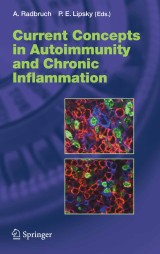Details

Current Concepts in Autoimmunity and Chronic Inflammation
Current Topics in Microbiology and Immunology, Band 305
|
213,99 € |
|
| Verlag: | Springer |
| Format: | |
| Veröffentl.: | 08.09.2006 |
| ISBN/EAN: | 9783540297147 |
| Sprache: | englisch |
| Anzahl Seiten: | 282 |
Dieses eBook enthält ein Wasserzeichen.
Beschreibungen
The immune system has been known to be capable of distinguishing self from non-self since the pioneering work of Paul Erhlich more than a century ago. Originally described in experiments studying blood transfusion comp- ibility, the principle of “horror autotoxicus” is still valid, although today the phenomenon is usually described in terms of tolerance or ignorance. A great deal has been learned about the various processes preventing self-reactivity normally. These include processes that operate during immune cell ontogeny and subsequently on reactivity of mature lymphocytes in the periphery. They encompass mechanisms that are intrinsic to potentially reactive lymphocytes and can result in central or peripheral deletion or the alteration of functional potential. In addition, there are in?uences that are extrinsic to potentially auto-reactive lymphocytes, including the function of regulatory cells, d- ferentiation state of antigen-presenting cells, availability of self-antigen, the cytokine and chemokine milieu, as well as the traf?cking patterns involved in generating productive immune interactions. It is clear that the immune system devotes a considerable effort to the avoidance of the development of potentially pathogenic self-reactivity. Despite this, the development of self-reactivity is relatively common. - though the development of autoimmune disease is less frequent, autoimmune diseases, such as rheumatoid arthritis, multiple sclerosis, systemic lupus e- thematosus, psoriasis, thyroiditis, and myasthenia gravis, are all too common, and can cause considerable morbidity and even mortality.
B Cell Tolerance—How to Make It and How to Break It.- Breaking Ignorance: The Case of the Brain.- Naturally Arising Foxp3-Expressing CD25+CD4+ Regulatory T Cells in Self-Tolerance and Autoimmune Disease.- Sex Hormones and SLE: Influencing the Fate of Autoreactive B Cells.- Innate (Over)immunity and Adaptive Autoimmune Disease.- Can Unresolved Infection Precipitate Autoimmune Disease?.- The Systemic Autoinflammatory Diseases: Inborn Errors of the Innate Immune System.- Inefficient Clearance of Dying Cells and Autoreactivity.- The Importance of T Cell Interactions with Macrophages in Rheumatoid Cytokine Production.- T Cell Activation as Starter and Motor of Rheumatic Inflammation.- Signalling Pathways in B Cells: Implications for Autoimmunity.- Immunological Memory Stabilizing Autoreactivity.- Genetics of Autoimmune Diseases: A Multistep Process.
Discusses the complex ethiopathologies of autoimmune diseases Explores the broad variety of cell types and genes involved Shows how initiating factors in autoimmune disease can possibly be distinct from those that drive the chronic course of the disease Explains that the importance of an individual factor can change during the course of the disease
<P>The ethiopathologies of autoimmune diseases are complex. A broad variety of cell types and gene products are involved. This book explores clinical and experimental evidence suggesting that the importance of an individual factor changes during the course of the disease. Factors and cell types that induce acute autoreactivity and initiate an autoimmune disease could be distinct from those that drive a chronic course of that disease.</P>

















